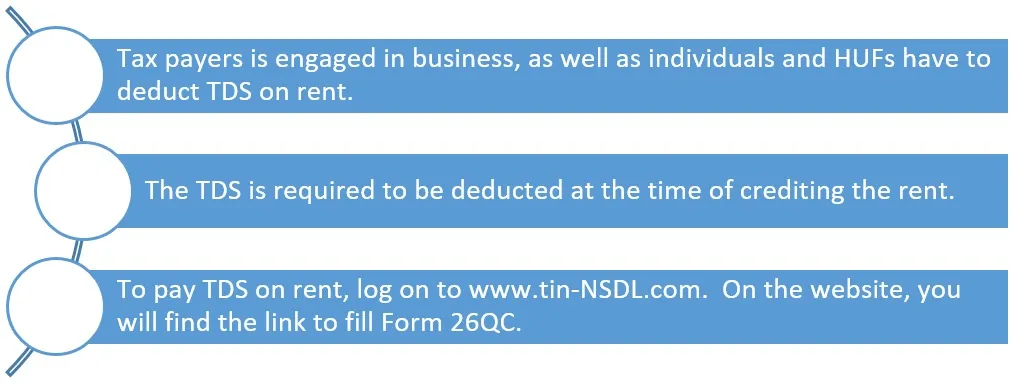All You Need to Know About TDS on Rent Limit
When it comes to rental income, understanding the intricacies of TDS (Tax Deducted at Source) is crucial. Section 194I of the Income Tax Act mandates that tenants deduct TDS on rent payments, ensuring that rental income is taxed at its source. This article will delve into the specifics of TDS on rent, including its definition, conditions, rates, and more.
What is TDS?
TDS is a type of income tax deducted by the person making the payment at the source of income. Essentially, it means that the tax liability is on the person receiving the money. TDS is applicable to various types of income, including rent, commission, professional fees, salary, and interest.
TDS on Rent Under Section 194I
Section 194I was introduced through the Finance Act, 1994, to cover rental income under the ambit of TDS payments. This section governs TDS on rent paid by businesses, while Section 194IB covers rent paid by individuals or Hindu Undivided Families (HUFs).
Definition of ‘Rent’ Under Section 194I
In the context of Section 194I, ‘Rent’ refers to any payment made under a lease, sub-lease, tenancy, or any other agreement for the use of:
- Land
- Building (including factory buildings)
- Land attached to a building (including factory buildings)
- Machinery
- Plant
- Equipment
- Furniture
- Fittings
This definition applies regardless of whether the payee owns these assets, meaning that subletting is also included.
Conditions for TDS Deduction on Rent
Section 194I stipulates that tenants must deduct 10% TDS on rent if the aggregate rent paid or likely to be paid during a financial year exceeds Rs 2.40 lakh. This limit is applicable for each payee, not for each property. If a landlord has let out multiple properties to the same lessee and the total rent exceeds Rs 2.40 lakh, TDS must be deducted.
When is TDS Not Required?
- Amount Below Rs 2,40,000 Annually: TDS is not applicable if the total rent paid or due during the financial year is Rs 2,40,000 or less.
- Tenant is an Individual or HUF: TDS under Section 194I is not required if the rent is paid by an individual or HUF not engaged in a business that undergoes an audit.
- Revenue Sharing in Film Exhibition Agreements: TDS is not applicable in revenue-sharing arrangements between a film distributor and an exhibitor.
TDS Deduction Rate on Rent in 2024
| Nature of Payment | TDS on Rent |
|---|---|
| Rent of plant and machinery | 2% |
| Rent of land or building or furniture or fittings | 10% (5% for Individuals and HUFs not liable for tax audit) |
Payments Covered Under Section 194I
Income from Letting Out Factory Buildings
Rent received from factory buildings is typically considered business income for the lessor but is still subject to TDS under Section 194I.
Rent Includes Service Charges
Service charges, especially those made to business centers, are included under the definition of rent for Section 194I purposes and are subject to TDS.
TDS Requirement for Separate Lessor of Building and Furniture
If a building is rented out by one person and the furniture by another, the tenant must deduct TDS for both.
TDS on Rent Payment Not Paid Monthly
TDS should be deducted at the time of credit or payment, regardless of whether the rent is paid monthly, quarterly, or annually.
Charges for Cold Storage Facilities
Payments for cold storage facilities are considered charges for using a plant, not rent for a building, and are governed by Section 194C instead of Section 194I.
Hall Rent Paid by an Association
Associations taxed as an Association of Persons (AOP) must deduct TDS if the rent exceeds Rs. 2,40,000.
Payments to Hotels for Seminars Including Meals
When hotels charge for premises and catering, Section 194I does not apply. Instead, Section 194C applies to the catering portion.
Who is Liable to Deduct TDS on Rent?
The provisions apply to all taxpayers, including companies, firms, trusts, and associations. However, if the payer is an individual or HUF, the provisions apply only if they are engaged in a business or profession requiring an audit.

What Happens if TDS is Not Deducted on Rent?
If TDS is not deducted, a penalty interest of 1% per month is applicable until the TDS is deducted.
How is TDS on Rent Calculated?
Tenants must deduct TDS when the payment to a resident landlord exceeds Rs 2.40 lakh annually. For non-resident landlords, TDS must be deducted under Section 195 without any threshold limit.
When is TDS Deducted on Rent?
TDS must be deducted at the time of crediting the rent in the books of accounts or at the time of making an advance payment.
How to Pay TDS on Rent?
Tenants must furnish transaction details online on the TIN website (www.tin-nsdl.com). Payment can be made online through e-tax payment options or by visiting authorized bank branches.
TDS Deduction on Rent Paid by Individuals and HUFs in 2024
| Rent Payer | TDS Rate | Threshold Limit |
|---|---|---|
| Companies, firms, trusts, associations, and individuals or HUFs engaged in business | 10% | Rs 2.40 lakh annually |
| Individuals and HUFs not covered above | 5% | Rs 50,000 per month |
TDS on Rent Paid to NRIs
According to Section 195, tenants must deduct TDS at 30% on rent paid to an NRI landlord for property in India. A TAN is required for this deduction.
Is TAN Mandatory for TDS on Rent?
Individuals or HUFs need a PAN to deduct and deposit TDS. Other assessees need a TAN.
Form for TDS Payment
To pay TDS on rent, log on to www.tin-NSDL.com and fill out Form 26QC with all necessary details.
Transit Rent Not Taxable: Bombay HC
The Bombay High Court ruled that rent received from a developer during a redevelopment project is not taxable, as it constitutes a ‘capital receipt’ rather than a ‘revenue receipt.‘
Conclusion
Section 194I of the Income Tax Act mandates the deduction of TDS on rent payments, ensuring that rental income is taxed at its source. Whether the rent pertains to land, buildings, machinery, or furniture, the responsibility of deducting and depositing TDS lies with the tenant, provided certain thresholds are met. Adhering to these rules is crucial to avoid penalties and maintain transparency in rental transactions.
